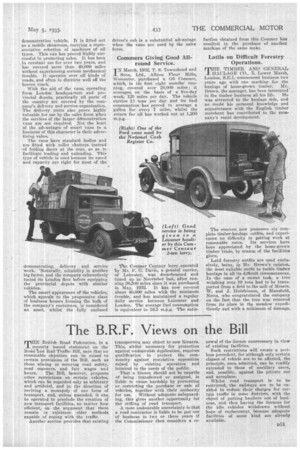The B.R.F. Views on the Bill T HE British Road Federation,
Page 125

If you've noticed an error in this article please click here to report it so we can fix it.
in a .recently issued statement on the Road Ind Rail Traffic Bill, says that no reasonable objection can be raised to certain provisions of the Bill, such as those aiming at securing road safety, road manners, and fair wages and hours. The Bill, however, proposes other restrictions on certain vehicles, which can be regarded only as arbitrary and artificial, and in the direction of reviving a monopoly of one form of transport, and, unless amended, it can be operated to preclude the creation of new transport facilities, no matter bow efficient, on the argument that there remain in existence older methods capable of coping with the traffic.
Another section provides that existing transporters may object to new licences. This, whilst necessary for protection against undesirable duplication, requires qualification to protect the community against restrictive opposition raised by existing operators and inimical to the needs of the public.
That a licence should not be capable of being transferred or assigned, is liable to cause hardship by preventing or restricting the purchase or sale of vehicles, together with their authority for use. Without adequate safeguarding, this gives another opportunity for the stifling of road transport. A most undesirable uncertainty is that a road contractor is Rattle to be put out of business in two or three years if the Commissioner then considers a re
newal of the licence unnecessary in view of existing facilities. Such restrictions will create a perilous precedent, for although only certain classes of vehicle are to be affected, the principle, once admitted, can be readily extended to those of ancillary users, and, possibly, against the private car and aeroplane. Whilst road transport is to be restricted, the railways are to be enabled to reduce their charges for certain traffic in some districts, with the object of putting hauliers out of business, and then having the licences for the idle vehicles withdrawn without hope of replacement, because adequate facilities of some kind are already available.




























































































































































































